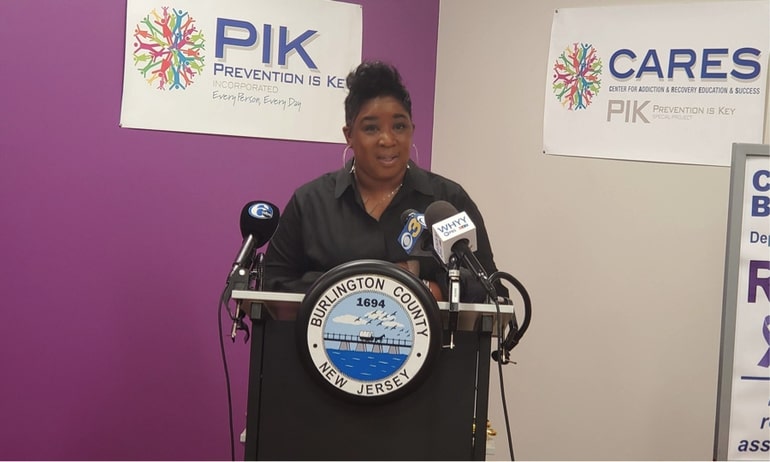
The Burlington County Commissioners announced the creation of a new advisory committee to help develop plans for how Burlington County will use its share of opioid epidemic settlement funds.
Approximately $13.6 million is expected to be paid to Burlington County over the next 18 years as part of the national settlement finalized earlier this year with drug manufacturer Johnson & Johnson and three pharmaceutical distributors. It’s part of $641 million in payments to New Jersey and $26 billion in nationwide settlements.
“The opioid epidemic has claimed the lives of hundreds of Burlington County residents and caused irreparable harm to county families and communities,” said Commissioner Felicia Hopson, the Board’s liaison to the Department of Human Services. “This settlement money will not undo those losses, but it will provide our county with significant resources to use in our fight to save lives and assist those suffering from addiction receive the support they require.”
In anticipation of the first settlement payment this summer, the commissioners voted on June 8 to create a Regional Advisory Council to give input, advice and recommendations for disbursement of Burlington County’s funds.
Leading the Advisory Council will be Burlington County Department of Human Services Director Shirla Simpson and Elfrieda Francis, the head of the County Division of Behavioral Health and Youth Services. The other members will be Evesham Deputy Mayor Heather Cooper, Acting Burlington County Prosecutor LaChia L. Bradshaw and Burlington County Solicitor Ashley Buono.
Hopson said the commissioners would rely on the Advisory Council members’ experience and expertise to determine how the funding can best be utilized.
“These advisory council members are experts in this field so it makes sense for them to advise us where these dollars can make the most difference. Whether its expansion of existing prevention programs, treatment and recovery supports or launching new initiatives to help break the cycle of addiction, I am confident that the funds will be well spent,” Hopson said.
Burlington County has been among the state leaders in responding to the opioid crisis and aiding those struggling with addiction. The county has also experienced its share of losses. There were 645 fatal overdoses and drug-related deaths between 2015 and 2019 in Burlington County.
Last year, the commissioners passed a resolution designating Burlington County to be stigma-free as part of a campaign to help those suffering from mental illness and substance use disorder by increasing awareness and combating misconceptions about them. In doing so, the commissioners also encouraged Burlington County municipalities, schools, businesses and nonprofits to join the campaign and support the stigma-free initiative.
Since passing the resolution, several of Burlington County’s largest towns have approved their own resolutions expressing support for the county initiative, including Burlington City, Evesham, Mount Holly, Mount Laurel and Pemberton Township. The Lenape Regional High School District, Burlington County Association of School Administrators and the Rowan College at Burlington County Board of Trustees have also approved resolutions of support.
The commissioners also expanded addiction services in the county through the launch of the Burlington County Recovery Center at the Human Services Building in Westampton. The Recovery Center serves as a “one-stop” destination where individuals can be paired with a recovery peer, and obtain information about treatment programs, recovery support services and community resources. Wellness activities and classes, and recovery groups such as Narcotics and Alcoholics Anonymous are also scheduled and held there.
The Recovery Center began operating virtually with Zoom meetings and online programs during the pandemic but is now operating with a peer recovery specialist available five days a week at the location. The Recovery Center and its staff have also organized several outdoor events for people to connect with others going through the same struggle, including walks through parks, and barbecues.
Burlington County has a Hope One Mobile Outreach Unit that travels to various locations in the county to link residents with recovery specialists and treatment facilities. Staff also train people on how to administer overdose antidotes. The unit is run by the Burlington County Human Services Department, Burlington County Sheriff’s Department, and the Burlington County Health Department, along with staff from Virtua, Maryville and the Deborah Heart and Lung Center.
In 2021, the program had close to 1,900 contacts and helped 26 people enter treatment programs. It also distributed 300 Narcan kits.
“Long before COVID-19, the addiction epidemic claimed unbearable numbers of lives at an alarming rate and we have been battling it,” Hopson said. “Our county continues to develop paths to better help our residents access treatment and receive the vital services and support they need to beat this terrible disease. The opioid settlement funds will help us continue this critical work. Each life saved is a victory and we will fight to save every life we can.”


